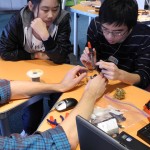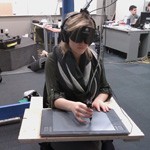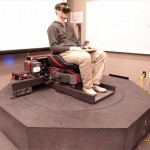
Position:
Alumnus (MSc Student, defended in 2014)
Contact:
amilne [at] sfu.ca
http://andrewmilne.ca
Affiliations:
Science World, SIAT @ Simon Fraser University, McMaster University
Biography
My work is about using education and technology to empower people.
As a Master’s student, my research explores the DIY or ‘maker’ community. It stems from my interest in rapid prototyping tools, such as 3D printers and microcontroller boards, and the community’s innovative use of online tools for collaboration, including: open education resources, open licensing on hardware and software, crowd funding, and blended learning spaces. My current project looks at common learning strategies and motivational habits in DIY.
Professionally, I teach an enrichment program where high school students come to work on hands-on design projects at Science World, the local science museum in Vancouver.
In my spare time, I build projects at the local hack space and I’ve teamed up with some fellow teachers to found Maker Mobile, a mobile invention workshop for youth.
You find contact information and more details about my current projects here.
Projects
The Tabletop Makerspace
The tabletop Makerspace was a Mitacs internship project conducted in collaboration with Science World. A set of classroom tools was developed to support ‘Maker’ activities at the museum. The tools included a home-built 3D printer and a set of electronics kits for working with the Arduino microcontroller. An introduction to electronics workshop was developed with local makers and Science World ...
Auditory Navigation Displays
Can spatial auditory cues enable us to remain oriented while navigating real or virtual environments? Non-visual navigation interfaces are crucial for the blind, who suffer great reductions in mobility because of the difficulty of navigating new environments. Sighted users may also benefit from these types of displays when they are navigating but can't see the screen of their mobile devi...
Spatial Updating With(out) Physical Motions?
How important are physical motions for effective spatial orientation in VR? Most virtual reality simulators have a serious flaw: Users tend to get easily lost and disoriented as they navigate. According to the prevailing opinion, this is because physical motion cues are absolutely required for staying oriented while moving. In this study, we investigated how physical motion cues contribute ...


